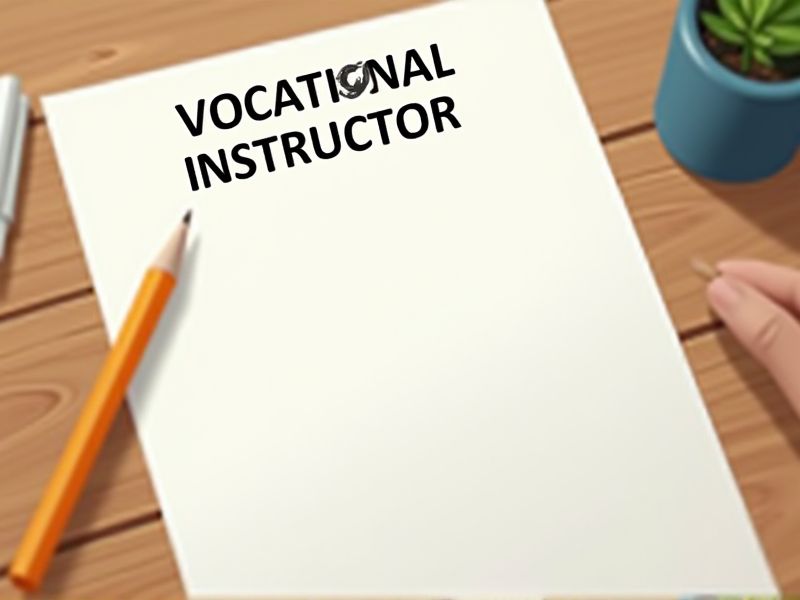
Vocational instructors guide students in acquiring specific skills and competencies that meet industry standards. Relevant certifications ensure these instructors possess the technical expertise necessary to educate effectively. Certifications also demonstrate an instructor's commitment to maintaining current industry knowledge. Here are some important certifications you may need as a Vocational Instructor.
Certified Vocational Instructor (CVI)
A Certified Vocational Instructor (CVI) ensures quality and standardization in vocational training programs, leading to improved educational outcomes for students. The certification process typically validates the instructor's knowledge, skills, and ability to teach effectively within specific trades or technical areas. This credibility boosts the confidence of both employers and students, ensuring that graduates are prepared for workforce demands. Moreover, a CVI designation can often lead to higher employment rates and better career advancement for instructors as institutions seek qualified professionals.
Adult Education Certification
Adult Education Certification enhances instructional skills by equipping vocational instructors with effective teaching methodologies tailored for adult learners. This certification ensures instructors understand the unique needs of adults, who often balance education with work and family responsibilities. Certified instructors are more adept at creating engaging, relevant curricula that improve learner outcomes. Certification often leads to better employment opportunities and career advancement within educational institutions.
Instructional Design Certificate
Possessing an Instructional Design Certificate equips vocational instructors with structured methodologies to develop and deliver effective educational programs. A well-designed curriculum enhances student engagement and learning outcomes by catering to various learning styles. This certification also provides instructors with tools to assess and adjust teaching strategies based on learner feedback and performance data. The credential can elevate an instructor's credibility in the industry, potentially leading to career advancements.
Certified Technical Trainer (CTT+)
Certified Technical Trainer (CTT+) ensures instructors have validated teaching skills necessary for vocational training. Having CTT+ certification can enhance instructors' credibility and align their teaching methods with industry standards. The certification provides a framework for delivering technical content effectively, which can improve student learning outcomes. Employers might prefer CTT+ certified instructors, as it suggests proficiency in both technical knowledge and instructional skills.
OSHA 30-Hour General Industry Certification
Increased safety compliance results from a Vocational Instructor holding an OSHA 30-Hour General Industry Certification, ensuring adherence to industry regulations. Enhanced credibility is often achieved, as this certification signals a comprehensive understanding of workplace safety standards. Instructors possessing this certification can effectively educate students on identifying and mitigating potential hazards, leading to a safer learning environment. The certification also equips instructors with the knowledge to reduce workplace accidents, improving overall industry safety culture.
First Aid and CPR Certification
Vocational instructors often work in environments where practical, hands-on activities occur, increasing the likelihood of accidents or injuries. Having First Aid and CPR certification equips instructors with the necessary skills to respond effectively to medical emergencies, potentially reducing the severity of injuries. This certification also enhances the safety culture within the educational setting, reassuring both students and employers about the preparedness of the instructional staff. Many institutions and employers require or prefer instructors with such certifications, aligning with occupational safety regulations and standards.
Curriculum Development Certification
Curriculum Development Certification equips vocational instructors with the skills to design effective and relevant training programs, ensuring alignment with industry standards. This certification enhances the instructors' ability to assess and modify curricula, improving student outcomes and engagement. Certified instructors often gain credibility, increasing trust from employers and educational institutions. Continuous professional development through certification helps instructors stay current with evolving vocational education trends and technologies.
Industry-Specific Technical Credential
Industry-specific technical credentials validate a vocational instructor's expertise in a particular field, enhancing the credibility of their instruction. These credentials ensure that instructors are up-to-date with current industry standards, enabling them to teach relevant skills. The presence of such credentials can increase student confidence, as they are more likely to trust an instructor with recognized qualifications. Employers seeking skilled graduates often prefer programs with credentialed instructors, influencing program enrollment and success rates.
Microsoft Office Specialist (MOS) Certification
The Microsoft Office Specialist (MOS) Certification provides vocational instructors with a standardized validation of their skills, which enhances their credibility and teaching effectiveness. With a MOS Certification, instructors can better prepare students for industry demands, as these certifications align with commonly used workplace software. Earning a MOS Certification can also open additional career opportunities and potential salary increases for instructors. Instructors with MOS Certification can integrate advanced software skills into their curriculum, ensuring students gain practical and relevant expertise.
Communication Skills Enhancement Certification
Vocational instructors must possess strong communication skills to effectively convey complex technical information to diverse learners, ensuring students grasp practical concepts. Enhanced communication abilities enable instructors to foster better classroom dynamics, leading to improved student engagement and retention. Certification in communication skills demonstrates a commitment to continuous professional development, making instructors more attractive to potential employers. Employers often seek certified instructors to maintain high educational standards and ensure consistent, high-quality student outcomes.
Summary
As a vocational instructor, acquiring new certifications enhances your teaching credibility and broadens your skill set. Certifications lead to increased job opportunities and higher salary prospects due to your validated expertise. Your students benefit from updated and relevant knowledge, improving their educational outcomes. The institution also sees improved performance metrics, attracting more students to its programs.
